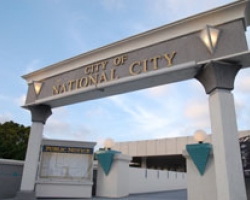The National City Community and Police Relations Commission brought together Law Enforcement Training Director Rachel Salamanca from the Museum of Tolerance and National City Police Administrative Lieutenant Chris Sullivan at a May 20 meeting for a wide scope on mandated police training from both perspectives.
The Museum of Tolerance, Salamanca said, is the educational arm of the Simon Wiesenthal center and opened in 1993, shortly after the civil unrest in Los Angeles as a space where people can talk about uncomfortable subjects.
Briefly, Salamanca explained that the professional training program was built up after directors noticed adults chaperoning school groups often had more questions than the students. The museum decided to build on that with professional training and the first groups to pass through were actually law enforcement agencies.
The museum currently offers state-funded training that is certified by California POST, a standard of training established in 1959 for California law enforcement officers. Facilitators at the museum have trained over 150,000 members of various law enforcement agencies from across the United States, as well as some international groups including Canadian and Israeli police forces.
“A lot of states leave their law enforcement agencies to their own devices. Any other kinds of training law enforcement agencies decide to add is always above the minimum standards set by POST and that includes academy training,” Salamanca said.
To better explain the facility and how it figures into professional training, she gave the Holocaust display as an example. It’s not a memorial, Salamanca said it’s “an extreme example of how an intelligent, civilized society becomes uncivilized”.
She has personally seen many people pass through the display and question “What would I have done? Would I have helped someone? Would I have hidden someone?” with a focus on the bystanders.
Another zone looks at more contemporary issues from a historical context, such as generational trauma with discriminatory laws and prejudiced behavior patterns.
Doubling back to expound on the POST legislature, Salamanca said California is one of only a few states that have established standards for law enforcement training of this sort.
“Really, our goal here is to assist law enforcement professionals as they explore the evolving role of law enforcement in a rapidly changing, increasingly diverse and complex society,” Salamanca said.
Commission Vice Chair Marianne Delatorre, stated National City has a high population of Latinos and Filipinos, and asked if racial bias training is geared toward interacting with those populations.
“There is no possible way that any of us can become an expert on any of this. The new term these days is actually Cultural Humility. It really means: how can we humble ourselves and meet the person, become curious about the other person? One of the core foundations of the museum is leveraging our shared humanity, that we’re all human,” Salamanca said.
Describing a racial bias activity, Salamanca said they address how past experiences activate current behavior. Interestingly, she said City Managers have sometimes participated in a “day in the life of an officer” activity and “it has been eye-opening” for them.
Delatorre also asked how training is evaluated for effectiveness.
“I will be honest with you and say that would require a whole lot of resources the museum does not have, in literally having to follow a police force for five years,” Salamanca said, suggesting that an evaluation tool for racial bias training is not the same as one for something like firearms training.
Sullivan connected Salamanca’s overview of courses with a look into regular and ongoing National City police training.
“Perishable Skills training includes classes officers are POST mandated to attend every two years. In that period, every officer has to go through training on bias-based policing, defensive tactics, domestic violence, firearms, first aid and CPR, tactical communication, de-escalation and vehicle operations,” Sullivan said.
In addition, he said, officers are legally mandated to attend crisis response training, defensive tactics, de-escalation, hate crimes, human trafficking, pursuit training, principled policing, patrol rifle training, racial and cultural diversity training and continued professional training on top of job-specific training for specialized assignments.
On top of that, the National City Police department also mandates training like COVID-19, Fentanyl, officer wellness, sexual harassment, taser and pepper ball training, spike strip training and other types of training.
Delatorre questioned whether completing training every two years allows for timely updates.
Over 10,000 hours were spent on training in 2018 and over 13,000 hours were spent on training in 2019 through various platforms including in person, self-paced and online training, Sullivan said, but did not expound on whether or how updated material is provided to officers between those two-year training cycles.












